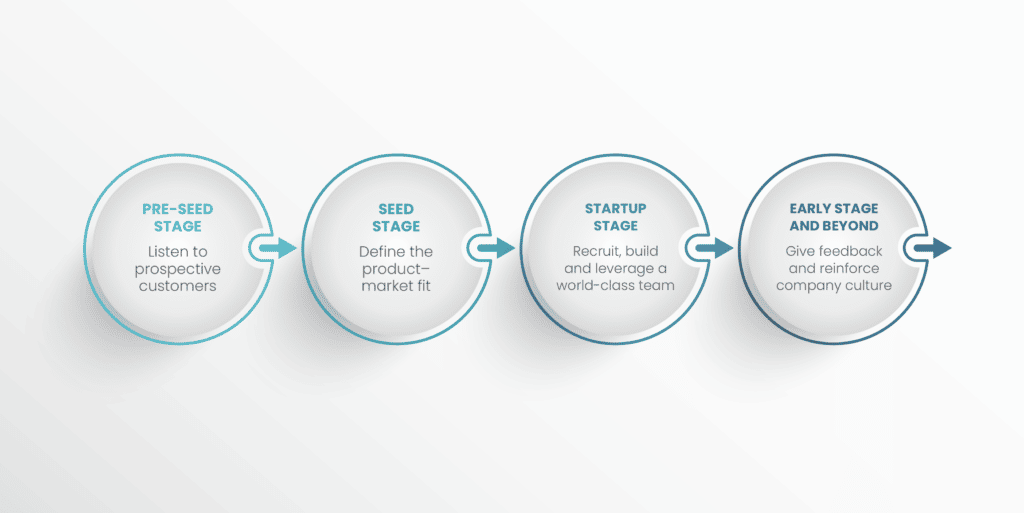While success in the early stages of a startup is extremely encouraging and gratifying, it also means the company is growing, expanding, and every aspect of the business is part of this.
On the other side, many processes and challenges are only getting started once your startup moves beyond the concept and pre-seed stage.
An evolving startup needs an evolving leader: the startup CEO
Contents
The Role of the CEO
The CEO is the highest position in an organization. They can be hired, elected by the board of directors, or, as it is often the case with startups, the CEO is the founder and main shareholder of the company. This means, startup CEOs are often very driven and passionate about what they are doing but lack the traditional experience of a CEO with years of C-Suite and leadership experience.
The Role of the CEO in a Startup
Startups can be understood as a company with a very specific type of organizational performance. The startup model, bright idea-turned-business venture, often has a small, young, and determined workforce.
This results in a unique intersection of the need for entrepreneurship and leadership. At the same time, limited financial resources, high time pressure, and a small team of often young employees can put substantial strain on the startup. This results in the need for strong leadership from the startup CEO.
How can a startup CEO effectively tailor and optimize their leadership to help a growing startup succeed?
Leadership Responsibilities of the Startup CEO
Every startup has a different bright idea that the concept, prototype and ultimately the startup’s entire product or service is built around. Growth at every stage generates new attributes, needs and challenges that need to be met at a speed unfamiliar to established companies.
For every startup CEO this means adjusting focus and time allocation, developing new skills, and seeking advice from the full range of available advisors as the startup’s growth accelerates and the workforce grows.
Startup CEO Skills and Responsibilities at a Glance
Define a Vision
The startup CEO must have and nurture a clear and powerful vision for the company’s long-term success.

Why does this company exist? This is the first question and part of the startup’s foundation. Building on this, Simon Sinek’s Golden Circle can help to curate and create a long-term vision for success – and that falls to the CEO.
Once you have your startup’s ‘Why’, communicating it clearly and frequently to the employees is essential for them to feel a connection and a common purpose which will in turn boost productivity and play a big part in creating positive company culture.
When leaders and employees are united under a clear and powerful vision, it brings support and purpose for all during tight deadlines, high workloads, new challenges and sudden setbacks.
Allocate Time
Depending on the stage of a startup, different aspects will take up bigger chunks of the CEO’s time. Adjusting focus and amounts of time spent when necessary is essential for the startup CEO’s success. High on the list of time commitments for startup CEOs are:

Develop Skills

The CEO of a startup is responsible for all aspects of the business. As the startup scales, mastering and embracing new skills fast is essential.
The evolution of the startup CEO from a lone wolf to the leader of a thriving organization with a leadership team comes with a steep learning curve for many. Growing numbers of employees and possibly a board of directors requires a professional, and personal, growth mindset.
- Recruiting the right team and team leaders
- Creating and fine-tuning the organizational structure
- Building a leadership team
- Speaking to and networking with a growing audience of investors and customers
- Creating and embodying company culture
Seek Advice

Other factors aside, startup growth and ultimately startup success is dependent on the entrepreneur and founder to learn how to lead the company.
Building a network, maintaining relationships and seeking counsel, an outside perspective is what every startup CEO needs. From fellow startup founders and industry experts, to investors and board members: startup CEOs need to take advantage of others’ experience and expertise
▶️ Market, product and customer-oriented feedback
▶️ Founders and leaders who recently experienced a particular stage
▶️ Professionals with experience in hiring and resource allocation
▶️ Feedback from investors and the board of directors
▶️ Shaping and reinforcing company culture
Implement Company Culture

No matter the industry, product or service, every startup needs a CEO who shapes and implements company culture. While there are many nuances that CEOs need to consider for their specific startup, the key areas of company culture are:
▶️ Encourage speed through collaboration
▶️ Promote and reward notorious excellence
▶️ Model two-way open, transparent communication
▶️ Hire a diverse workforce to ensure long-term success and an open, welcoming culture
Startup CEO Challenges
Challenges arise when the startup CEO lacks any of the skills and responsibilities or delivers too little too late.
Other important business challenges are external factors that arise through the current global economic situation.
The Conference Board lists the most important ones that resulted from their 2022 Survey of CEOs.
Global business challenges that CEOs are concerned about:
▶️ COVID-19 disruptions
▶️ Rising inflation
▶️ Supply chain disruptions
▶️ Changing consumer behaviors
▶️ Cybersecurity
▶️ Climate Change (long term risk)
▶️ Labor shortages
Global business challenges that CEOs are concerned about:
▶️ Accelerating digital transformation
▶️ Retaining talent
▶️ Improving cash flow
▶️ Developing future leaders
▶️ Modifying business models
Startup CEOs: Key Search Hires Your Leaders
Franziska Palumbo-Seidel,
CEO and founder of Key Search
How do you hire a leader for your startup? Key Search helps you find and hire the leaders who will take your company to the next level.
How do you define who is needed in your startup’s leadership team? How can you attract the best possible candidates? For startup CEOs and founders alike, it is crucial to be able to answer these questions.
Key Search understands the ins and outs of the executive hiring process. We help some of the world’s most exciting startups and fast-growth companies hire their leaders. It would be my pleasure to take you through our process in a first meet and greet call to discuss how we can help you hire your leaders.
